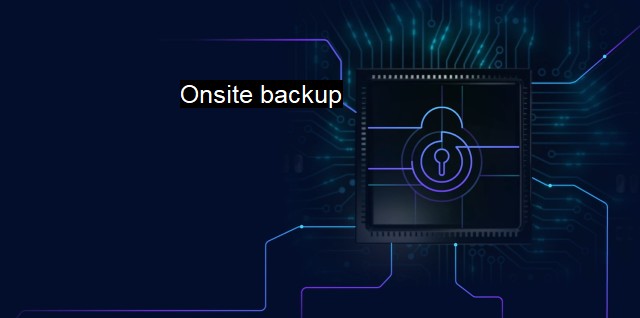What is Onsite backup?
Understanding Onsite Backup: Benefits, Drawbacks, and the Significance of Cybersecurity and Antivirus in Data Protection
Onsite backup is a critical aspect of data security strategy. Predominantly, it involves storing copies of your data on a local server or storage device, within your business premises. It’s a popular practice in the cybersecurity landscape recognized for its obvious advantages of quick access and control. In the event of a data loss occasion, onsite backup can minimize downtime and enable rapid restoration of data.In distinguishing between benefits and risks of their data backup choices, many businesses decide on the onsite method. This choice leverally offers faster data recovery speed. Since the data is stored locally, retrieving it doesn't rely on internet speed as is the case with some other types of backups. This means that users are in a position to recover large files or entire systems quite swiftly, avoiding significant downtime that could hamstring operational processes.
Another advantage of onsite backup is control. Data stored on premises can be quickly and directly manipulated or overseen. The owners also have the assurance of knowing exactly where their data resides. It's important to note this doesn’t necessarily guarantee data security. This fact brings up another vital point about onsite backup that businesses must consider: the need for robust cybersecurity measures, including antivirus solutions.
The act of backing up data is essentially a preventative measure to mitigate the impacts of data loss events, among which cybersecurity attacks can be quite harmful. Onsite backup should thus be complemented with an effective antivirus or other cybersecurity protectSoftware that safeguards against potential threats, such as malware, ransomware attacks, or intrusion attempts. Keeping your backup systems clean from any viruses is crucial for the safety and integrity of the backup data.
For instance, if a computer on the network is compromised by a virus, and the backup solution isn't equipped with an effective antivirus system, backup procedures could unwittingly copy and preserve that compromised data. This could lead to an infective spread of the virus when such data is restored or accessed. Therefore, having an antivirus is critical in not only protecting the source data but also safeguarding the backup systems.
It’s crucial to keep antivirus software updated for effectiveness. Cyber threats are continually evolving and spreading, hence the requirement for persistent advancements in cybersecurity measures. Updated antivirus software ensures that the latest threats are recognized and fended off, shielding both primary and backup data.
Onsite backups come with some risks too. For instance, data stored onsite is susceptible to physical threats such as fire, floods, theft, or damage. Also, sudden hardware malfunctions or a power failure could lead to loss or corruption of data. To ascertain complete data protection, it’s thus essential to combine onsite backup with off-site or cloud backups-accounting the 3-2-1 backup strategy; which recommends having three copies of your data, on two different types of storage, with one backup maintained off-site.
Onsite backup is a fundamental part of an effective data protection strategy. By storing data backup onsite, businesses can facilitate rapid recovery after a data loss event, minimize business disruptions, and maintain productivity. simultaneous implementation of robust cybersecurity, including an updated antivirus solution, is also critical to counter potential cyber threats; ensuring the backup data is likewise protected. Employing a comprehensive onsite-offsite backup practice, whilst maintaining robust cybersecurity, therefore necessitates securing businesses from potential data loss calamities.

Onsite backup FAQs
What is onsite backup?
Onsite backup is a data backup strategy that involves storing a copy of your critical data on a local device or server within your organization's premises. This strategy ensures that you have immediate access to your data in case of data loss or system failure.Is onsite backup secure?
Onsite backup can be secure if appropriate security measures are put in place to protect the backup data from unauthorized access or theft. It is advisable to have multiple layers of security such as encryption, access controls, and physical security to safeguard the backup data.What are the benefits of onsite backup?
Onsite backup offers various benefits, including quick data recovery, easy accessibility, and cost-effectiveness compared to offsite backup. With onsite backup, you have complete control over your data, and you do not have to worry about internet connectivity issues.What are the disadvantages of onsite backup?
Onsite backup may not be suitable for disaster recovery scenarios as it may be prone to physical damage, theft, or natural disasters that can affect the integrity of the backup data. Additionally, onsite backup may require additional investment in hardware, maintenance, and security.| | A | | | B | | | C | | | D | | | E | | | F | | | G | | | H | | | I | | | J | | | K | | | L | | | M | |
| | N | | | O | | | P | | | Q | | | R | | | S | | | T | | | U | | | V | | | W | | | X | | | Y | | | Z | |
| | 1 | | | 2 | | | 3 | | | 4 | | | 7 | | | 8 | | |||||||